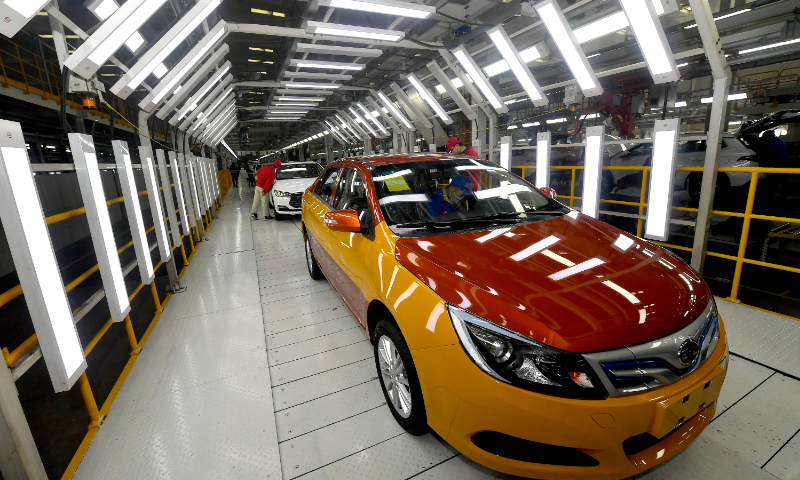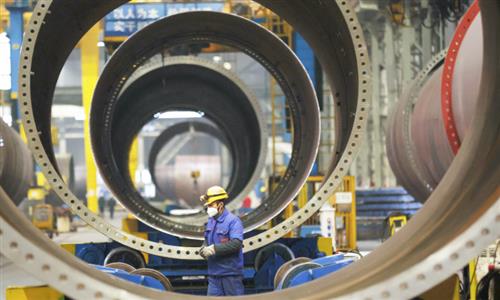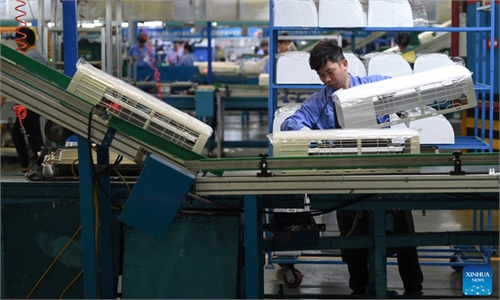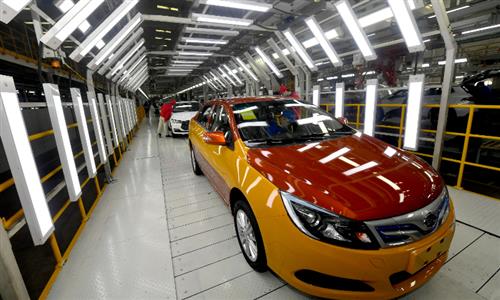
Staffers work at the auto assembly production lines of BYD Xi'an new energy industrial base in Xi'an, Northwest China's Shaanxi Province, on February 25, 2020. Photo: Xinhua
China has been vigorously rolling out an ambitious action plan aimed at fostering large-scale equipment renewal and trading-in of consumer goods across various regions. The endeavor is expected to tap a 1-trillion-yuan consumption market, thereby sustaining the nation's industrial upgrading and bolstering high-quality development.
The action plan, issued by the State Council, the country's cabinet, aims to further stimulate consumption recovery, facilitate the construction of the circular economy, and provide new impetus for economic growth from both the supply and demand sides, experts noted.
The move highlights trading-in of big-ticket consumer goods such as cars, home appliances, and furniture, which represents a vast market exceeding 5 trillion yuan ($690 billion) annually, according to the National Development and Reform Commission (NDRC), China's top economic planner.
A sales manager surnamed Yan from a BYD store in Beijing told the Global Times on Thursday that the company has launched its most substantial car exchange subsidy plan to date, in a bid to boost sales and promote sustainable development. This effort has already drawn a large number of customers to the store.
Meanwhile, home appliance trade-ins are also seeing a boom. Chinese home appliance giant Suning is promoting a trade-in program that covers most brands, with more than half of the products eligible for at least a 10 percent discount. It will also introduce more discounts this weekend, thanks to policy support, a marketing director surnamed Zhang told the Global Times on Thursday.
Aside from Beijing, major cities such as Shanghai, Nanjing, Suzhou, and Taizhou have also launched a slew of trade-in measures with subsidy amounts exceeding hundreds of millions of yuan, according to media reports.
As a populous country, China's huge automobile, home appliance, and durable goods markets offer great potential regarding the circular economy and industrial upgrading, which will open up more development opportunities for enterprises and contribute significantly to the economic growth targets for 2024, Cong Yi, a professor at the Tianjin University of Finance and Economics, told the Global Times on Thursday.
In line with the plan, China's financial regulators jointly removed loan caps for personal purchases of internal combustion or new-energy vehicles at the start of April, granting financial institutions full discretion over loan amounts to boost vehicle trade-ins.
According to the action plan, the scale of equipment investment, in areas including industry, agriculture, construction, transportation, education, culture, tourism, and medical care, is set to increase by more than 25 percent by 2027 compared with last year.
By 2027, China aims to double the recycling volume of scrapped cars from 2023 levels, while achieving 45 percent growth in the trading volume of second-hand cars and 30 percent growth in the recycling volume of used home appliances, according to the NDRC.



